There are many possible causes for white tongue, and in some cases, it comes with an unpleasant odor and mouth dryness. To get rid of it, sometimes you just need to brush your teeth. But what should you do if that doesn’t help?
❗ This article is for informative purposes only and can’t replace the advice of a specialist.
What white tongue is
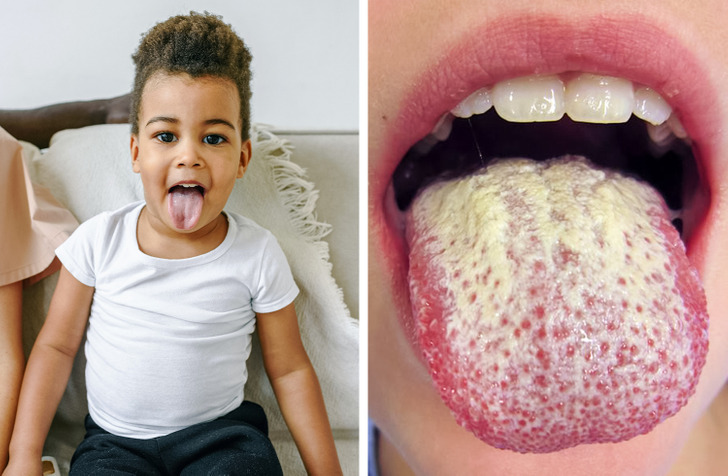
The white film may cover the entire tongue, part of it, or appear as spots. At the same time, an unpleasant odor and taste in the mouth may appear. It looks as if there are small white hairs on the tongue’s surface. In fact, they are buds covered with organic particles, bacteria, and dead cells.
White plaque on the tongue (which can also be yellow) may appear for different reasons, like due to irritation or because of an infection. It usually disappears after several days. If the situation doesn’t change for several weeks, and it’s painful to eat and talk, it’s best to see a doctor.
It’s important to note that the plaque may not only be white. While a pink tongue is normal, a brown tongue means the person drinks too much coffee or tea. A yellow tongue means there’s something wrong with the liver, and a red tongue is a sign that the person lacks vitamin B.
Why the tongue becomes white
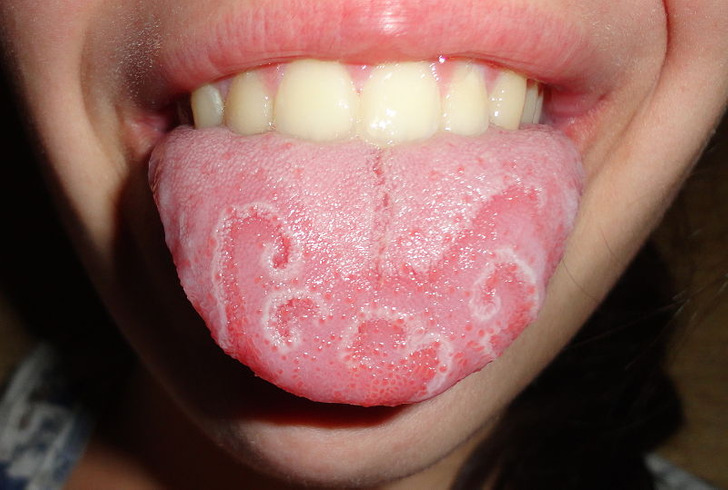
Usually, the tongue becomes white due to bacteria, leftover bits of food, or dead cells that get stuck in between the buds. Because of this, the buds may increase in size or become inflamed. This is how white spots on the tongue’s surface appear.
Sometimes, the plaque appears due to an illness. For example, the geographic tongue is also a condition where white spots appear on the tongue. It’s quite rare, and the causes are unknown, but the condition itself is often connected to eating foods that irritate the tongue. It may also be a reaction to stress, an illness, or hormonal changes.
Why white plaque appears on the tongue
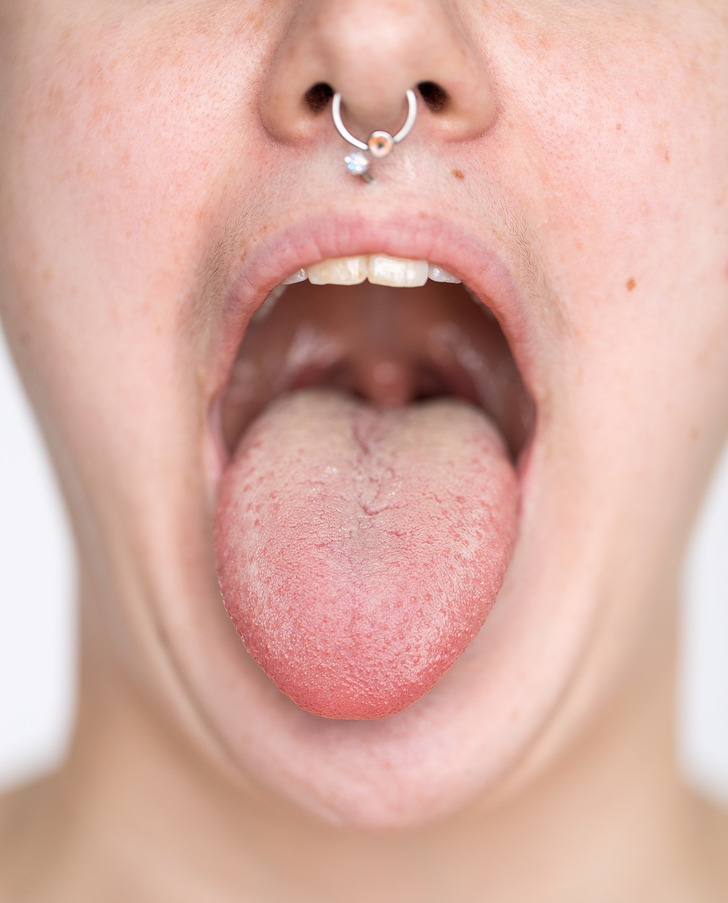
There are some things that make the appearance of white plaque on the tongue more probable:
- Age
- Taking antibiotics (white-yellow plaque appearing when there’s a fungal infection in the mouth)
- A diet that’s lacking enough fruits, vegetables, vitamin B12, and iron
- A weak immune system
- Bad mouth hygiene
- Dental prosthetics or other objects that can damage the tongue
- Dehydration and mouth dryness
What piercings have to do with white tongue
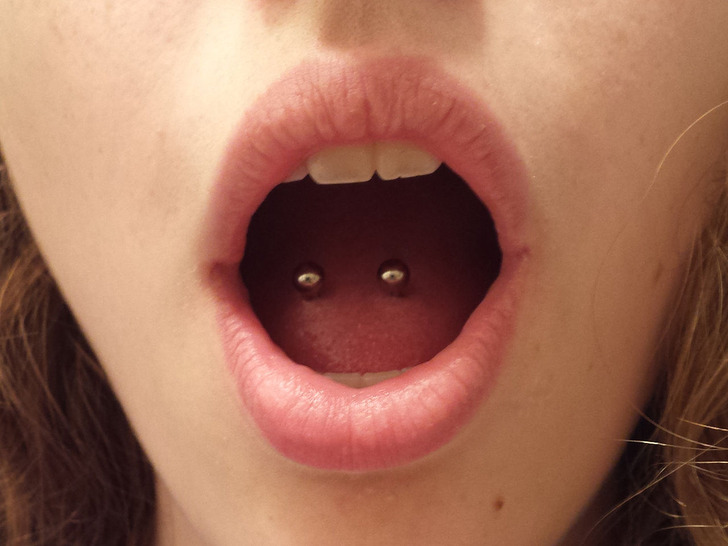
Right after piercing the tongue, there might be some white film present. This happens because the number of bacteria on the tongue increases, and it’s normal. Antibacterial mouthwash will help you get rid of it. Plus, there might be a ring around the piercings, which is normal too, and it means the tissue is healing.
If the plaque appears due to an injury (including piercings), the healing should take around 1.5 weeks. You should avoid irritants, such as hot, spicy, or sour foods and drinks.
How to get rid of white tongue at home
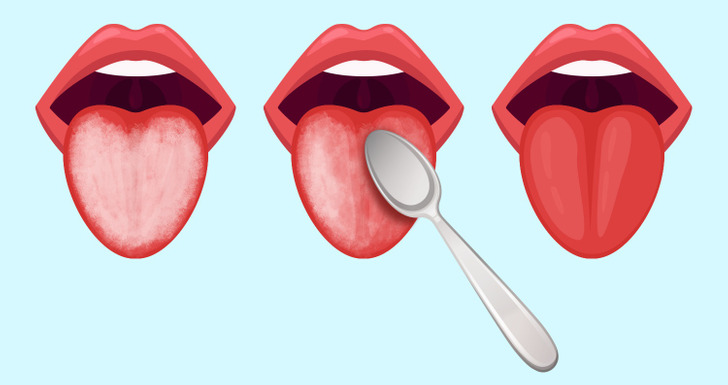
- Practice good mouth hygiene.
- Drink enough water.
- Brush your teeth using a soft toothbrush.
- Use a mild fluoride toothpaste — one that doesn’t contain sodium lauryl sulfate.
- Use fluoride mouthwash.
- Brush your tongue or use a tongue scraper to remove the white coating.
- Drink cold drinks through a straw.
- Avoid food and drinks that are spicy, salty, acidic, or very hot in temperature.
Who to talk to if you’re worried about your white tongue
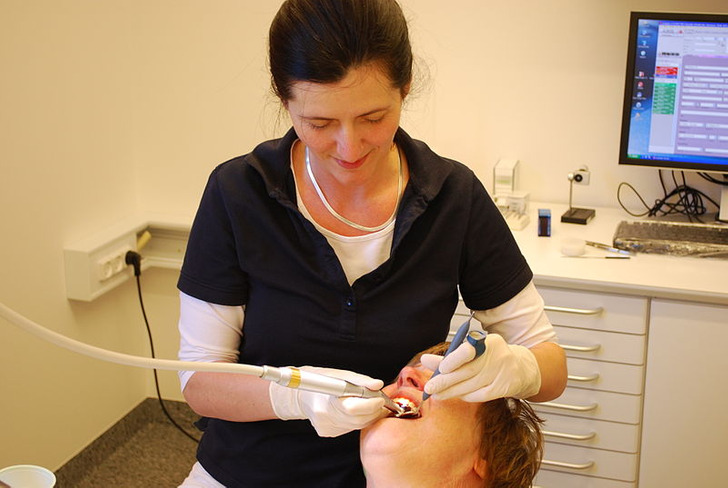
- Your dentist can help you remove the white film from the tongue and prescribe medications if needed.
- Your GP can diagnose the tongue, prescribe you certain medications and determine if the white tongue is an indicator of a more serious issue.
What do you do about white tongue?
Preview photo credit Genusfotografen (genusfotografen.se) & Wikimedia Sverige (wikimedia.se) / Wikimedia Commons, CC BY-SA 4.0, Martanopue / Wikimedia Commons, CC BY-SA 3.0
Nós adotamos uma menina de 4 anos – Um mês depois, ela veio até mim e disse: ‘Mamãe, não confie no papai’

Um mês depois de adotar Jennifer, ela olhou para mim com os olhos arregalados e sussurrou: “Mamãe, não confie no papai”. Suas palavras ecoaram em minha mente enquanto comecei a me perguntar que segredos meu marido poderia estar escondendo.
Olhei para o rosto pequeno de Jennifer, observando aqueles olhos grandes e atentos e o sorriso tímido e incerto que ela tinha. Depois de todos aqueles anos de esperança, tentativa, espera, aqui estava ela, nossa filha.

Uma pequena menina feliz | Fonte: Pexels
Richard estava praticamente brilhando. Ele não conseguia parar de olhar para ela, como se estivesse tentando memorizar cada característica, cada expressão.
“Olhe para ela, Marla”, ele sussurrou, sua voz cheia de admiração. “Ela é simplesmente perfeita.”
Dei-lhe um sorriso suave, minha mão descansando no ombro de Jennifer. “Ela realmente é.”

Uma família feliz e sua filha | Fonte: Pexels
Nós tínhamos percorrido um longo caminho para chegar aqui. Foram consultas médicas, longas conversas e uma papelada interminável de adoção. Quando finalmente conhecemos Jennifer, algo em mim simplesmente… sabia. Ela tinha apenas quatro anos, era tão pequena e tão quieta, mas já parecia nossa.
Já faz algumas semanas que adotamos Jen oficialmente, e decidimos que era hora de um pequeno passeio em família. Richard se abaixou até o nível dela, sorrindo calorosamente. “Ei. Que tal irmos tomar um sorvete? Você gostaria?”

Um homem conversando com sua filha pequena | Fonte: Freepik
Jennifer olhou para ele, então olhou para mim, como se esperasse minha reação. Ela não respondeu imediatamente, apenas deu um pequeno aceno, pressionando-se mais perto do meu lado.
Richard riu baixinho, embora eu pudesse ouvir uma pitada de nervosismo nela. “Tudo bem, sorvete é isso. Vamos fazer um tratamento especial.”

Um homem brincando com sua filha | Fonte: Freepik
Jennifer ficou perto de mim enquanto saíamos. Richard liderou o caminho, olhando para trás de vez em quando e sorrindo esperançoso. Eu o observei tentar persuadi-la a sair, para fazê-la se sentir à vontade. Mas cada vez que ele fazia uma pergunta, o aperto de Jennifer em minha mão ficava um pouco mais forte, seu olhar se voltando para mim.
Quando chegamos à sorveteria, Richard foi até o balcão, pronto para pedir para ela. “Que tal chocolate? Ou talvez morango?”, ele perguntou, sua voz animada.

Um homem escolhendo sorvete | Fonte: Midjourney
Ela olhou para ele, depois olhou para mim novamente, sua voz quase um sussurro. “Vanilla, por favor.”
Richard pareceu surpreso por apenas um segundo, então sorriu. “Vanilla então.”
Jennifer parecia contente em deixá-lo pedir, mas notei que ela mal olhou para ele quando nos sentamos. Em vez disso, ela comeu em silêncio, ficando perto de mim. Ela observou Richard com um interesse cauteloso, sem dizer muita coisa, e eu me perguntei se era tudo demais para ela.

Uma jovem séria | Fonte: Pexels
Mais tarde naquela noite, enquanto eu colocava Jennifer na cama, ela ficou agarrada ao meu braço um pouco mais do que eu esperava.
“Mamãe?” ela sussurrou, com a voz hesitante.
“Sim, querida?”
Ela desviou o olhar por um momento, depois voltou a olhar para mim, olhos arregalados e sérios. “Não confie no papai.”

Uma garota séria conversando com sua mãe | Fonte: Midjourney
Eu congelei, meu coração pulou uma batida. Ajoelhei-me ao lado dela, escovando seu cabelo para trás. “Por que você diria isso, querida?”
Ela deu de ombros, mas seus lábios se curvaram para baixo em uma pequena carranca triste. “Ele está falando estranho. Como se estivesse escondendo alguma coisa.”
Levei um momento para responder. Tentei manter minha voz gentil. “Jennifer, papai te ama muito. Ele só está tentando te ajudar a se sentir em casa. Você sabe disso, certo?”

Uma mulher sorridente conversando com sua filha | Fonte: Midjourney
Ela não respondeu, apenas se enrolou um pouco mais forte sob os cobertores. Fiquei ali, segurando a mão dela, me perguntando de onde isso vinha. Ela poderia estar apenas nervosa? Talvez se ajustar fosse mais difícil para ela do que eu imaginava. Mas quando olhei para seu rosto pequeno e sério, um leve desconforto surgiu.
Quando finalmente saí do quarto dela, encontrei Richard esperando na porta. “Como ela foi?”, ele perguntou, seu rosto esperançoso.

Um homem sério | Fonte: Pexels
“Ela está dormindo”, respondi suavemente, observando sua expressão.
“Isso é bom.” Ele pareceu aliviado, mas notei como seu sorriso vacilou um pouco. “Eu sei que é tudo novo para ela. Para todos nós. Mas acho que ficaremos bem. Você não acha?”
Eu assenti, mas não consegui afastar a sensação das palavras de Jennifer ecoando em minha mente.

Uma mulher imersa em pensamentos | Fonte: Pexels
No dia seguinte, enquanto eu mexia o macarrão no fogão, ouvi a voz de Richard vindo da sala de estar. Ele estava ao telefone, seu tom baixo e tenso. Parei, limpando minhas mãos em uma toalha, e ouvi suas palavras flutuando para a cozinha.
“Tem sido… mais difícil do que eu esperava”, ele disse, sua voz quase um sussurro. “Ela é… esperta. Jennifer está percebendo mais do que eu pensava que ela perceberia. Tenho medo que ela conte para Marla.”

Um homem falando ao telefone de costas para a câmera | Fonte: Pexels
Senti meu coração acelerar, minha mente correndo para dar sentido ao que eu tinha ouvido. Jennifer poderia me contar ? Me contar o quê ? Tentei me livrar disso, dizendo a mim mesma que devia haver uma explicação. Mas enquanto eu ouvia, meu pulso só batia mais forte.
“É só que… tão difícil manter as coisas em segredo”, Richard continuou. “Não quero que Marla descubra… não até que esteja pronto.”

Uma mulher séria e suspeita | Fonte: Freepik
Eu congelei, agarrando o balcão. O que eu não deveria descobrir? O que ele poderia estar escondendo de mim? Eu me esforcei para ouvir, mas então sua voz ficou mais baixa, e eu não consegui entender o resto da conversa. Alguns momentos depois, ele encerrou a ligação e começou a andar em direção à cozinha.
Voltei-me para o fogão, minha mente girando. Mexi o macarrão com mais força do que o necessário, tentando agir normalmente enquanto Richard entrava, parecendo satisfeito.

Um homem sorridente olhando para sua esposa cozinhando | Fonte: Pexels
“O cheiro aqui é bom”, ele disse, me abraçando.
Forcei um sorriso, minhas mãos segurando a colher. “Obrigada. Quase pronto.” Minha voz soou estranha para meus próprios ouvidos, e senti meu sorriso vacilar enquanto suas palavras ecoavam em minha cabeça: Tenho medo que ela conte para Marla… É difícil manter as coisas em segredo.

Uma mulher cozinhando com um sorriso forçado | Fonte: Midjourney
Mais tarde naquela noite, depois de colocarmos Jennifer na cama, não consegui mais me segurar. Eu precisava de respostas. Encontrei Richard na sala de estar, folheando alguns papéis, e sentei-me em frente a ele, com as mãos firmemente entrelaçadas no meu colo.
“Richard”, comecei, minha voz mais firme do que me sentia, “ouvi você falando ao telefone mais cedo.”

Um casal tendo uma conversa séria | Fonte: Pexels
Ele olhou para cima, erguendo uma sobrancelha, uma mistura de surpresa e… algo mais cruzando seu rosto. “Oh?”, ele disse, claramente pego de surpresa. “O que você ouviu?”
Hesitei, escolhendo minhas palavras cuidadosamente. “Ouvi você dizer que Jennifer pode… me contar algo. E que é difícil manter as coisas ’em segredo’.” Encontrei seu olhar, meu coração batendo forte. “O que você está escondendo de mim?”

Uma mulher triste e séria abraçando os joelhos | Fonte: Pexels
Por um momento, ele apenas me encarou, seu rosto uma mistura de confusão e preocupação. Então, quando a compreensão surgiu, sua expressão se suavizou. Ele colocou seus papéis de lado e se inclinou para frente, pegando minha mão.
“Marla”, ele disse gentilmente, “não estou escondendo nada de ruim. Eu prometo.” Seu aperto na minha mão era quente, reconfortante, mas não aliviou os nós no meu estômago.

Um homem frustrado | Fonte: Pexels
“Então o que é?”, sussurrei, mal conseguindo encará-lo. “O que você não quer que Jennifer me diga?”
Richard respirou fundo, seu rosto se abrindo em um sorriso envergonhado. “Eu não queria que você descobrisse porque… bem, eu estava planejando uma surpresa para o aniversário de Jennifer. Com a ajuda do meu irmão.” Ele apertou minha mão, parecendo um pouco envergonhado. “Eu queria que fosse algo importante, um primeiro aniversário especial conosco.”

Um homem sério falando em seu sofá | Fonte: Midjourney
Pisquei, sem processar suas palavras a princípio. “Uma festa surpresa?”, perguntei lentamente, a tensão no meu peito diminuindo um pouco.
Ele assentiu. “Eu queria que fosse perfeito para ela. Pensei que poderíamos mostrar a ela o quanto nos importamos. Que ela é parte da nossa família agora.” Ele sorriu, parecendo um pouco aliviado. “Eu sabia que Jennifer poderia dizer algo, e fiquei preocupado que ela estragasse a surpresa.”

Uma festa surpresa para uma menina pequena | Fonte: Midjourney
Uma onda de alívio tomou conta de mim, embora eu sentisse uma estranha pontada de culpa. Aqui estava eu imaginando… bem, eu nem sabia o que estava imaginando. “Richard”, sussurrei, abaixando a cabeça, “sinto muito. Eu só… pensei que havia algo errado.”
Ele riu baixinho, passando o polegar na minha mão. “Ei, está tudo bem. Eu entendo. Nós dois estamos apenas tentando nos ajustar.”

Homem e mulher de mãos dadas | Fonte: Pexels
Eu assenti, tentando me livrar das dúvidas que tinham tomado conta de mim. “Eu acho que Jennifer é apenas… protetora”, eu disse, tentando explicar. “Ela não sabe o que esperar, e quando ela me disse para não confiar em você… eu acho que isso simplesmente me pegou.”
Richard assentiu pensativamente. “Ela é uma criança sensível. Acho que ela ainda está encontrando seu caminho.” Ele olhou para mim, sua expressão séria. “Nós só teremos que garantir que ela se sinta segura e amada. Nós três.”

Um casal feliz conversando no sofá | Fonte: Midjourney
Na manhã seguinte, enquanto eu observava Richard gentilmente ajudar Jennifer a escolher seu cereal matinal, senti meu coração se animar um pouco. Ele olhou para ela com tanta paciência, e mesmo que ela mal olhasse para cima, eu podia ver a confiança lentamente crescendo entre eles.
Eu andei até eles e me juntei a eles na mesa, minha mão descansando no ombro de Jennifer. Ela olhou para mim, seus olhos calmos, e um pequeno sorriso surgiu em seu rosto. Era como se ela pudesse sentir a nova paz entre nós, como se alguma preocupação não dita finalmente tivesse se dissipado.

Uma família feliz brincando junta | Fonte: Pexels
Gostou desta história? Considere conferir esta : Chelsea e Peter estavam planejando o casamento dos sonhos quando tudo desmoronou de repente. Chelsea chegou em casa um dia e encontrou seus pertences embalados em malas e Peter desaparecido sem explicação. Enquanto ela tentava entender o que aconteceu, segredos chocantes e traições vieram à tona.
Este trabalho é inspirado em eventos e pessoas reais, mas foi ficcionalizado para fins criativos. Nomes, personagens e detalhes foram alterados para proteger a privacidade e melhorar a narrativa. Qualquer semelhança com pessoas reais, vivas ou mortas, ou eventos reais é mera coincidência e não intencional do autor.
O autor e a editora não fazem nenhuma reivindicação quanto à precisão dos eventos ou à representação dos personagens e não são responsáveis por nenhuma interpretação errônea. Esta história é fornecida “como está”, e quaisquer opiniões expressas são as dos personagens e não refletem as opiniões do autor ou da editora.

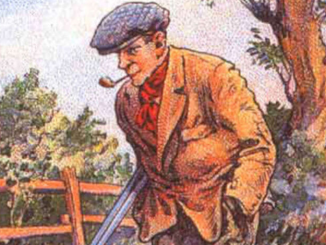

Leave a Reply